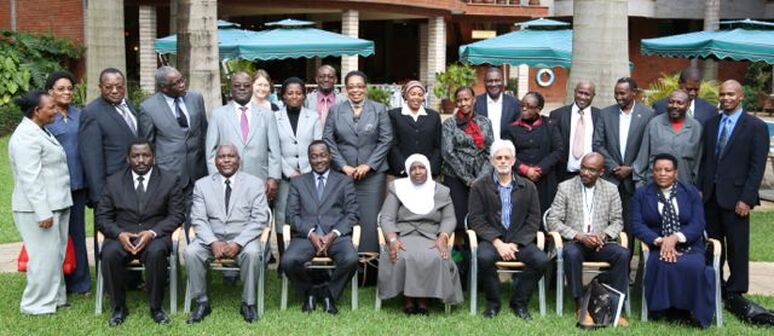Bringing Indigenous Rights to the High Court of Tanzania
For two days in May 2014, Judges and Registrars from Tanzania’s High Courts (Dar es Salaam, Arusha, Moshi, Mbeya and Tanga) participated in a ground-breaking training on indigenous peoples rights. “You opened our eyes, we knew very little about indigenous people,” said one participant. “I now know why indigenous people are so persistent about natural resources and why they insist on land and natural resources being included in the constitution,” said another.
Aiming to increase the Tanzanian judiciary’s understanding about African indigenous people and their connection to land and natural resources, the training, which was facilitated by UCRT with support from the International Work Group for Indigenous Affairs (IWGIA) and Minority Rights Group International, was the first of its kind in all of Africa. Facilitators came from Universities of Arizona and Pretoria as well as the International Labor Organization in Geneva. Community representatives from indigenous Tanzanian groups provided testimonies about their livelihood systems and their dependence on land and natural resources for their survival.
Tanzania’s two unique hunter-gatherer groups, the Akie and Hadzabe, and the pastoralist Barabaig and Maasai, are the four groups in Tanzania that consider themselves as ‘indigenous,’ relating to an internationally accepted definition. Although these groups have distinct cultural and social dimensions, they do share a number of commonalities, such as their strong attachment to land and a unique cultural identity, as well as social and political struggles, such as marginalization, poverty, tenure insecurity and inadequate political representation. Tanzania voted in favor of the United Nations Declaration on the Rights of Indigenous Peoples in 2007, yet it does not recognize the existence of any indigenous people in the country and there are no specific policies or legislation protecting indigenous rights. Instead, a number of policies and programs actually undermine indigenous people’s rights.
UCRT works with all four communities to help them secure and benefit from their land and natural resources, and this training was one program aimed at increasing awareness about indigenous peoples rights in the country.
Tanzania’s two unique hunter-gatherer groups, the Akie and Hadzabe, and the pastoralist Barabaig and Maasai, are the four groups in Tanzania that consider themselves as ‘indigenous,’ relating to an internationally accepted definition. Although these groups have distinct cultural and social dimensions, they do share a number of commonalities, such as their strong attachment to land and a unique cultural identity, as well as social and political struggles, such as marginalization, poverty, tenure insecurity and inadequate political representation. Tanzania voted in favor of the United Nations Declaration on the Rights of Indigenous Peoples in 2007, yet it does not recognize the existence of any indigenous people in the country and there are no specific policies or legislation protecting indigenous rights. Instead, a number of policies and programs actually undermine indigenous people’s rights.
UCRT works with all four communities to help them secure and benefit from their land and natural resources, and this training was one program aimed at increasing awareness about indigenous peoples rights in the country.

